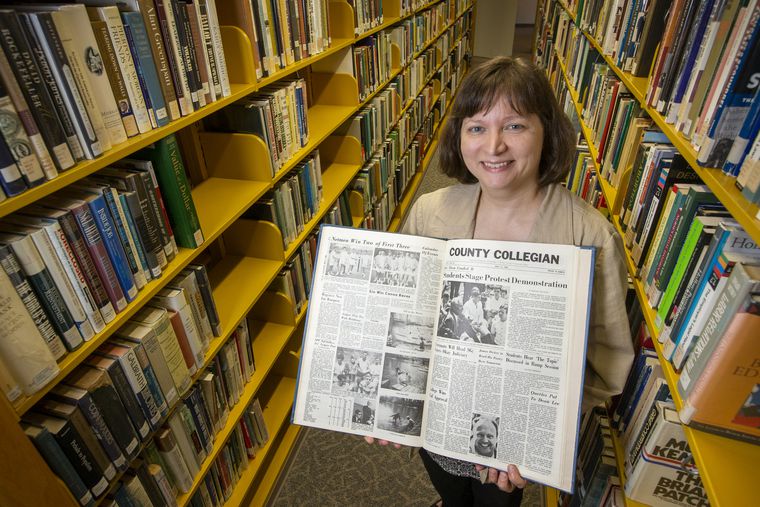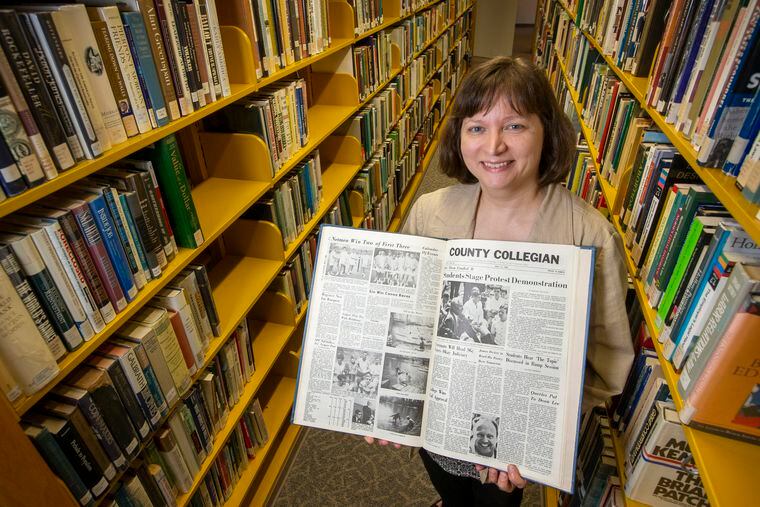

After word got around that Bucks County Community College would be hosting a talk by a “practicing homosexual” on May 9, 1968, the school’s president, Charles E. Rollins, received 100 complaints and decided to cancel the engagement three hours before it was to start.
As many as 200 students promptly held a demonstration that made headlines in college and local newspapers. They also made history a full year before the Stonewall riots launched the modern LGBTQ rights movement and eclipsed most of the pathbreaking events and organizations that preceded it.
Named for a mob-owned Greenwich Village bar that was frequently raided by police, the Stonewall uprising — with two fabulously fierce transgender women of color named Sylvia Rivera and Marsha P. Johnson as key players — began on June 28, 1969, and continued for six days. StonewalI energized, focused, and intensified the movement and ultimately gave birth to Pride Month.
“High-profile protests like Stonewall don’t come out of nowhere,” said the historian and author Marc Stein, who brought the forgotten Bucks County incident to light with the help of Monica Kuna, director of library services at the college in Newtown, Pa.
“We have documentation on another two dozen protests [nationwide] that were the context out of which Stonewall and the very successful movement of the 1970s and ’80s grew,” he said. “I am convinced there are a whole bunch of other [forgotten] actions would help us understand the road to Stonewall.”
Stein, a professor of history at San Francisco State University who earned his Ph.D. at Penn, said the protest was among the largest of any pre-Stonewall demonstrations and one of only two known to have taken place at a college campus before 1969.
“At other campuses and colleges around the state you started seeing activity a year or two after Stonewall, often at urban universities such as Penn and Temple,” said Barry Loveland, the coordinator of the Pa. LGBT History Network. The network is doing research for a traveling exhibit about LGBTQ activism on Pennsylvania campuses before and after Stonewall.
The fact that Bucks County College students rebelled after a gay activist — most of whom had likely never heard of him before — was barred from speaking at their picturesque suburban campus was “pretty amazing,” said Loveland.
During a recent interview from his Southern California home, Ralph Sassi, who was student government president at Bucks County in 1968, said a member of a new cultural activities group on campus sought his okay for the group’s plan to invite Dick Leitsch, the New York chapter president of the Mattachine Society, to speak.
Leitsch led Mattachine, founded as part of the fledgling ‘homophile’ movement in 1950, during the ”sip-ins” of 1966 that challenged regulations that made it illegal for New York bars to serve openly gay people. He died in 2018.
Sassi, who is not gay, was unfamiliar with Leitsch in May of 1968. But he saw no reason a student organization couldn’t use a mostly student-fee-supported fund to pay a speaker to appear on campus for a talk billed as The Problems of the Homosexual in Our Society.
“I really didn’t go into the background of what the politics of it were,” Sassi, 73, said from Southern California, where he is a retired travel industry professional.
Sassi estimated that 150 students attended the larger of two outdoor protests on the day of Rollins’ cancellation announcement. He can be seen in a County Collegian photo, wearing a tie and standing next to Rollins; the student government president told the crowd he was upset and disappointed by the decision, but asked those present to be respectful and orderly.
Rollins had been the founding president of the college and defended his decision to rescind the speaking invitation, saying it “would not be in the best interest of the student body or the community.” Rollins, who died in 2016, also took questions from students.
“I thought the best way was for everyone to be able to speak, and to listen,” said Sassi. “I thought it should be peaceful.”
Describing his own politics as “moderate to conservative,” Sassi also said that students “were trying to say they were mature enough to be able to listen to the subject in a college atmosphere. I thought there was nothing wrong with that.”
But some within the college and in the surrounding community did not share his evenhanded assessment. In an account of the protest posted on the website outhistory.org in April, Stein quoted comments made in local newspapers and letters to the editor in May of ‘68.
While some supported having Leitsch speak, mostly on First Amendment or academic freedom grounds, others expressed reservations, or horror, about what might have transpired had the lecture been allowed to proceed. Cries of “perversion” being taught and predictions of dire consequences from having “a homosexual … come onto the campus and bring his moral decay” were typical of the time.
But the hostility that erupted before and after the aborted lecture also underscores how bold it was for the Bucks County students, few if any of whom appear to have been ‘out’ in the modern sense, to demand a chance to listen to what a homosexual had to say.
“We don’t know how many of the students were true supporters of [LGBTQ] rights, or of Leitsch,” said Stein, 57, whose books include The Stonewall Riots: A Documentary History, and City of Sisterly and Brotherly Loves, which traces the early decades of the LGBTQ movement in Philadelphia.
But clearly, he added, “the Bucks County students were resentful, as were young people everywhere, about older people telling them how to live. A civil libertarian, anti-censorship mentality had taken hold by then and, for the students, homosexuality was no longer so taboo and so beyond the pale that it should fall outside of First Amendment protections.”
Lesbians, gay men, and transgender people “had been swept under the rug, but by the late Sixties the issue was coming in to the public consciousness,” said Daniel Brooks, the founder of New Hope Celebrates, an organization that promotes LGBTQ businesses as well as Pride Month activities in and around New Hope. The artsy tourist destination, located 10 miles north of Newtown, has long had a vibrant gay presence. Brooks also heads up the New Hope Celebrates History project, which is raising money for a documentary film that will tell the story of the local LGBTQ community.
Although Brooks, 71, said he was unaware of the college protest, “it doesn’t surprise me, because in 1968 everybody was protesting everything. It’s not surprising students would find [Leitsch being cancelled] a free speech issue and be very sensitive to it.”
Stein said he also was unaware of the protest until last year, when he noticed a three-paragraph story in a May 10, 1968 edition of the Inquirer while doing research that led him to Bucks County Community College’s Kuna, the library-services director.
“Last November, I received an email from Marc asking if somebody could look for information regarding this event that had taken place in 1968,” said Kuna, who had never heard of the protest, either.
She credited library technician Andrew Gottesman with helping her locate bound copies of the County Collegian, which covered the protest and its aftermath.
“Sometimes the most valuable stuff is not online,” Kuna said. “I expected to find a quarter of a page or a small mention, but there were a number of photos and some follow up articles. They did a nice job documenting what had happened.”
Bob Skiba, the curator of collections in the LGBTQ archives at the William Way center in Philadelphia, noted that media coverage of pre-Stonewall protests tended to be skimpy, or nonexistent. Even the 1965 sit-in at Dewey’s, the Center City restaurant that refused service to openly gay people, went largely unnoticed at the time, he said.
As the 52nd anniversary of the Stonewall riots approach, it’s important the Bucks County event be remembered, said Skiba, “because it ties what was going on in gay activism in 1968 with what was going on with antiwar, civil rights, and feminist activism” on and off campus across the country.
Like the Philly Queer Spaces and Pa. LGBT History Network projects, Stein’s continuing research into pre-Stonewall activism is a way of making sure that what was often hidden in the past can be preserved for educational or even inspirational purposes.
“I’d love to have Marc come to campus and give a talk about his work,” Kuna said.
Stein said he hopes to do so.